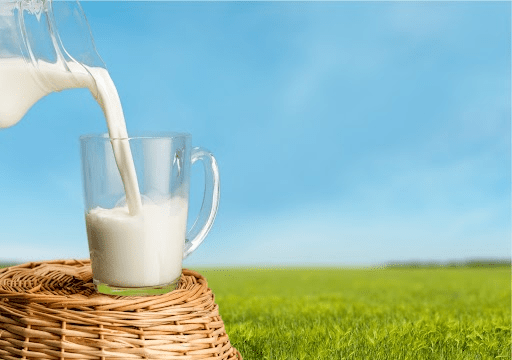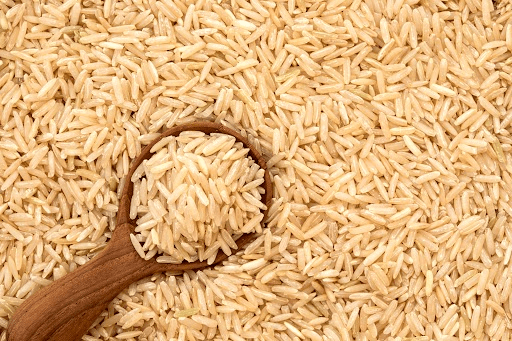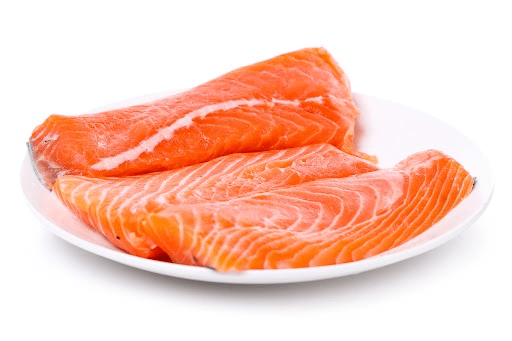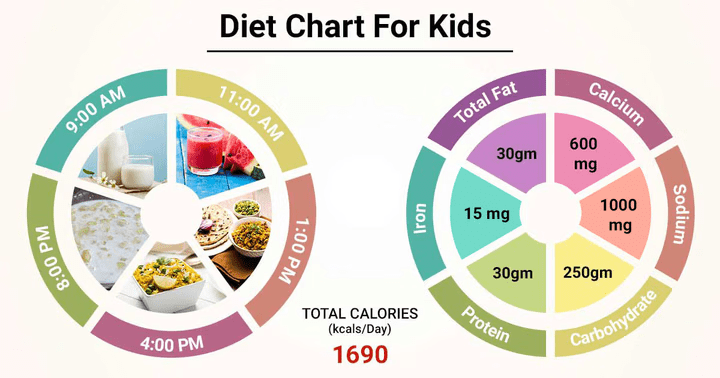“During the early years, it’s important to get nutrition right; what your little one eats now impacts health, growth, and development both in the short-term and in later life. Beyond nutrition, the right balance of food helps establish the habit of eating a healthy, varied diet with the rest of the family.”
– BBC good food
Table of Contents
1. 5 Healthy Categories of Food to Include in Toddler’s Diet Plan
2. 5 Easy and Beneficial Strategies to Support Healthy Eating in Toddlers
3. Nutritious Balanced Meal Plan for Kids
4. Diet Chart for Kids
5. Conclusion
Are you a new mom wondering how to prepare a toddler food chart that’s amazing yet healthy? Let’s dive in to understand more about balanced meals for toddlers.
Toddlers are at an age where they require a balanced diet chart for their overall growth and development. A toddler nutrition chart consists of various balanced meals for toddlers that provide all the essential nutrients the body requires. Parents must ensure their kids receive a balanced diet for kids to support their physical and cognitive development. It is important to note that the serving sizes in the nutrition chart for kids may vary depending on their age, weight, and activity level. Parents should also consult with their pediatrician to determine the appropriate serving sizes for their child & before blindly following a toddler food chart from the internet.
Additionally, it is essential to monitor your toddler’s intake of sugary and processed foods. These foods offer little nutritional value and can lead to obesity and other health problems later in life. Hence, parents should limit their toddler’s sugary drinks, candies, and processed snacks and focus on offering whole, nutrient-dense foods.
Overall, preparing balanced meals for toddlers is a helpful tool for parents to ensure their child receives all the necessary nutrients for their growth and development. By offering a variety of foods from each food group and limiting sugary and processed foods, parents can set their toddlers on a path towards a lifetime of healthy diets for kids.
5 Healthy Categories of Food to Include in Toddler’s Diet Plan
Here is a balanced toddler food chart to help parents make informed decisions about their child’s nutrition.
1. Fruits and Vegetables
Fruits and vegetables are essential to balanced meals for toddlers and must be included in the food chart for kids. They provide a range of vitamins, minerals, and fiber that support healthy growth and development. Toddlers should consume at least two servings of fruits and three servings of vegetables daily. Examples of fruits and vegetables include bananas, apples, carrots, peas, and spinach.
2. Protein

Protein is crucial for the development and regrowth of tissues in the body and is an essential item in the food chart for kids. Toddlers should consume about 2-3 servings of protein per day. Parents should ensure that the protein sources are age-appropriate and prepared in a safe and easy-to-chew manner for toddlers. It is also important to note that excessive protein intake can harm a toddler’s kidneys, so it’s best to stick to the recommended servings. Good protein sources for toddlers include lean meats such as chicken and turkey, fish, eggs, beans, and lentils.
Did you know that a kid’s food chart is essential to meet the complete dietary requirements of your little one?
3. Dairy

Dairy products such as milk, cheese, and yogurt are a great source of calcium, which is essential for strong bones and teeth. Hence, the dairy component is vital for a healthy diet for kids. Toddlers should consume at least 2-3 servings of dairy per day. Parents can offer low-fat dairy products to their toddlers to avoid excess intake of saturated fats.
4. Grains

Grains such as rice, pasta, bread, and cereal provide energy and nutrients such as fiber, vitamins, and minerals are essential in the balanced diet chart of a kid. Toddlers should consume 4-6 servings of grains per day. Parents should opt for whole grains such as brown rice, whole wheat bread, and whole-grain pasta to provide additional fiber and nutrients. Therefore, grains are crucial items in the toddler diet chart.
5. Healthy Fats

Healthy fats such as omega-3 fatty acids and monounsaturated and polyunsaturated fats are essential for brain development and overall health. Making it an important part of the toddler food chart. Good sources of healthy fats for toddlers include avocado, nuts and seeds, fatty fish such as salmon, and vegetable oils. Therefore, healthy fats must be included in the nutrition chart for kids.
Following a balanced toddler food chart ensures your little one receives all the nutrients required for growth and development. However, it is essential to note that portion sizes and meal frequency should be tailored to meet the needs of each individual toddler. Parents should consult a healthcare provider or a registered dietitian for a personalized toddler food chart for their child’s nutrition.
5 Easy and Beneficial Strategies to Support Healthy Eating in Toddlers
Apart from meals according to the toddler food chart, parents can also adopt some strategies to encourage healthy eating habits in their toddlers:
1. Offer a variety of foods
Toddlers may be picky eaters, but offering a variety of foods can help expand their palate and increase their nutrient intake. Parents can introduce new foods gradually and repeatedly to their toddlers to encourage them to try new things.
2. Offer small, frequent meals
Toddlers have small-size stomachs and may be unable to consume large meals. Offering small, frequent meals throughout the day can help ensure that they receive adequate nutrition.
Did you know that making and following a kids food chart improves their overall growth and development?
3. Encourage self-feeding
Toddlers should be encouraged to promote independence and develop their motor skills. Parents can offer finger foods such as fruits, vegetables, and cereal to encourage self-feeding.
4. Limit sugary and processed foods
Sugary and processed foods provide little to no nutritional value and can contribute to obesity and other health problems. Parents should limit their toddler’s intake of these foods and opt for healthier alternatives. Further, decreasing sugar and junk foods is essential while introducing kids’ food charts.
5. Be a role model
Parents should be positive in promoting balanced meals for toddlers. Toddlers are more likely to adopt healthy eating habits if they see their parents eating healthy foods. These are the five strategies to encourage eating as per toddler diet chart.
Nutritious Balanced Meal Plan for Kids: for 7 days of the Week
The balanced diet chart aims to help you provide nutritious meals required for growth and development of your kids.It is always recommended to check with your pediatrician once and be cautious of foods that may be allergic to your kids. You can alter the diet accordingly. The meal plan includes a diverse range of healthy ingredients, such as fruits, vegetables, whole grains, lean proteins, and dairy products, while suggesting tasty and traditional Indian dishes that kids will love!
1. Monday
Breakfast: Soft idli +coconut chutney +banana
Mid-morning snack: Steamed and mashed carrots with a pinch of ghee
Lunch: Khichdi +vegetables +yogurt
Afternoon snack: Soft chapati +mashed avocado
Dinner: Soft dosa with vegetable kurma + mashed papaya
2. Tuesday
Breakfast: Soft uttapam + tomato chutney + mashed apple
Mid-morning snack: Boiled +mashed potato +a pinch of turmeric
Lunch: Soft roti with dal fry + mashed peas
Afternoon snack: Soft dhokla +mint chutney
Dinner: Upma + vegetables + mashed pear
3. Wednesday
Breakfast: Soft poha + peanut powder + mashed mango
Mid-morning snack: Steamed and mashed pumpkin + a pinch of cinnamon
Lunch: Vegetable pulao + raita
Afternoon snack: Soft idli + coconut chutney Dinner: Soft roti + paneer bhurji + mashed grapes
4. Thursday
Breakfast: Soft ragi porridge + jaggery + mashed banana
Mid-morning snack: Boiled and mashed beetroot + a pinch of cumin
Lunch: Soft chapati + chana masala + yogurt
Afternoon snack: Soft uttapam + tomato chutney
Dinner: Khichdi + vegetables + mashed papaya
5. Friday
Breakfast: Soft semiya (vermicelli) upma + mashed apple
Mid-morning snack: Steamed and mashed green beans + a pinch of ghee
Lunch: Soft roti + moong dal + mashed carrots
Afternoon snack: Soft dhokla + mint chutney
Dinner: Soft idli + sambar + mashed pear
6. Saturday
Breakfast: Soft rava dosa + coconut chutney + mashed mango
Mid-morning snack: Boiled and mashed sweet potato + a pinch of cinnamon
Lunch: Vegetable khichdi + raita
Afternoon snack: Soft chapati + mashed avocado
Dinner: Soft uttapam + vegetable kurma + mashed grapes
7. Sunday
Breakfast: Soft vegetable cheela + mashed banana
Mid-morning snack: Steamed and mashed broccoli + a pinch of cumin
Lunch: Soft roti + palak paneer + yogurt
Afternoon snack: Soft idli + coconut chutney
Dinner: Upma + vegetables + mashed papaya
Diet Chart for Kids

Conclusion
Providing a balanced diet to toddlers is essential for their growth and development. Parents should develop a routine of referring to the toddler food chart regularly. They should offer a variety of foods from each food group to ensure that their toddlers receive all the necessary nutrients.
Encouraging your toddler to try new foods by making them fun and exciting can help introduce new and healthy foods into their diet using a toddler nutrition chart. It is also important to model healthy eating habits by eating various nutritious foods yourself.
Lastly, avoiding using food as a reward or punishment for toddlers is essential. This can create an unhealthy relationship with food and may lead to emotional eating later in life. Instead, offer praise and encouragement for a balanced diet for kids and try to create a positive and relaxed atmosphere during mealtimes. Providing balanced meals to toddlers is essential for their growth and development.At EuroKids, we work towards establishing healthy eating habits along with experiential learning. Click here to know more or to visit a Eurokids centre for preschool admission for your child.
For informative and accurate articles on all things related to your new born-toddler’s development, growth, health and nutrition, follow EuroKids Blogs and do check out our nationally recognized preschools – EuroKids for the first step in your kid’s educational journey!
















